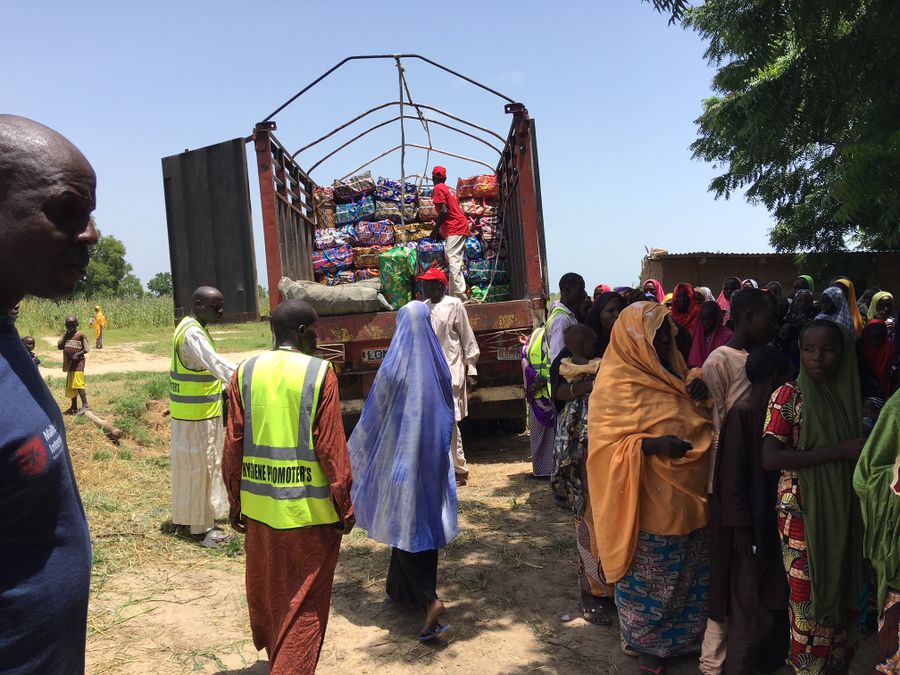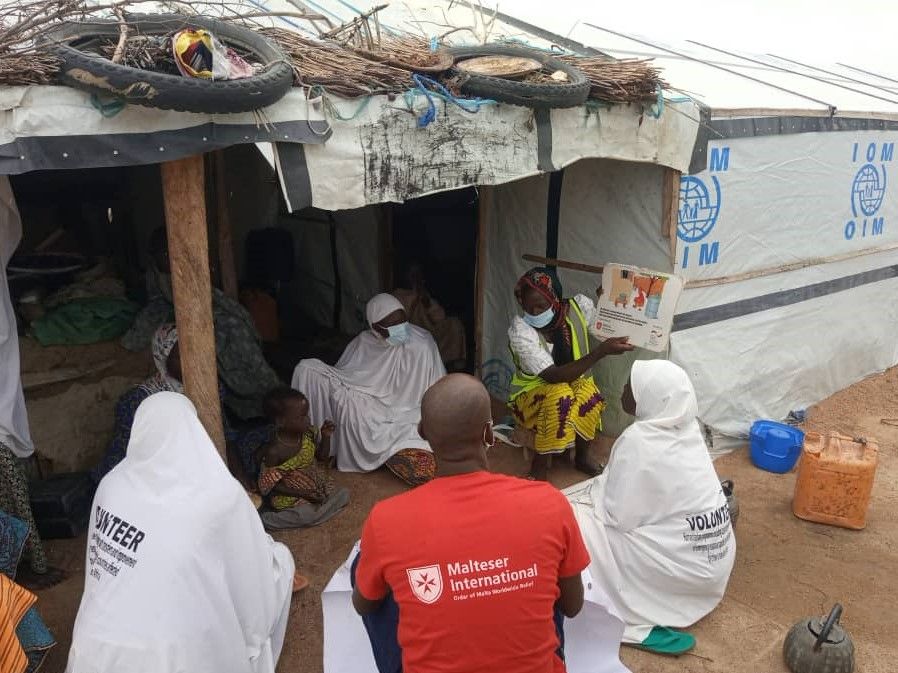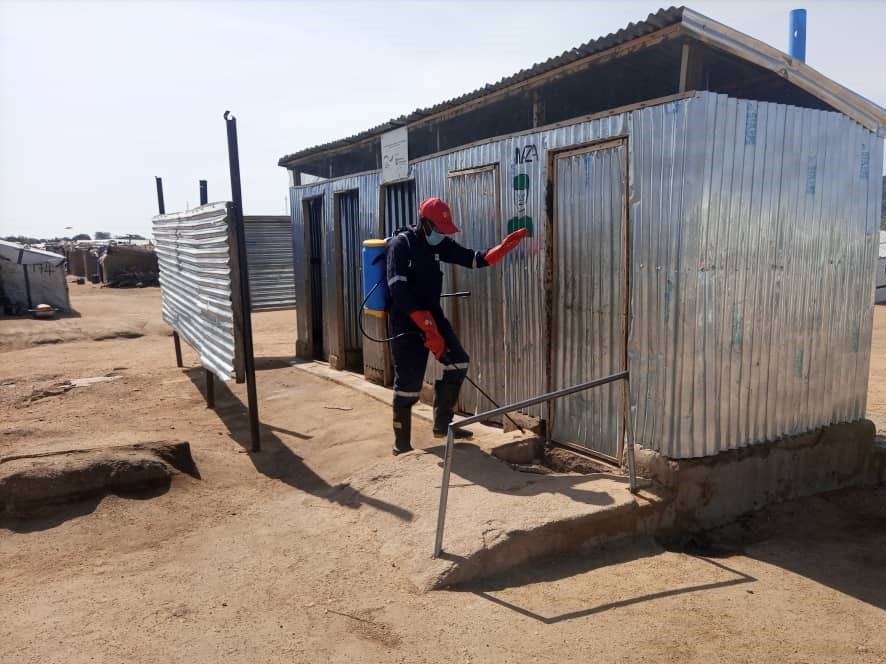Safe water, sanitation and hygiene
We are committed to providing people with access to clean drinking water to prevent the spread of diseases.
Read more
Cholera is a highly contagious infectious disease that causes vomiting and severe diarrhea. It is particularly prevalent in regions where poor hygiene, unsafe drinking water and food, and poor sanitation conditions create an increased risk of recurrent cholera outbreaks. According to WHO, there are 1.3 to 4 million cases of cholera worldwide each year, of which up to 143,000 are fatal. Through health projects, Malteser International works to ensure safe access to clean water and sanitation in high risk areas such as Nigeria, and provides emergency relief in the event of acute outbreaks to contain the spread of the disease and to prevent it from becoming fatal for community members.
Cholera is an acute bacterial infection of the gastrointestinal tract that has occurred worldwide since the 19th century and, if left untreated, can lead to death in children and adults alike. The highly contagious disease is caused by the bacterium Vibrio cholerae, which is ingested through contaminated water and food and thus triggers the cholera infection in the gastrointestinal tract and leads to characteristic symptoms of vomiting and diarrhea.

The greatest risk for transmission of the cholera pathogen is posed by poor hygienic conditions, to which people in infrastructurally weak regions, crisis or disaster-prone areas are particularly exposed. There is often a lack of clean drinking water and sanitary facilities. In informal settlements or refugee camps, people also live together in confined spaces. These factors massively increase the risk of infection and spread, as healthy people come into contact with infected feces, for example. As a result, the disease spreads rapidly and can even develop into an epidemic. In war and disaster areas, the risk of a cholera outbreak is also high if, for example, floods cause contamination of drinking water or earthquakes or acts of war destroy sewage systems.
The incubation period for cholera is around 12 hours to five days, with the disease breaking out in around one in ten people who become infected with the pathogen. However, due to the high potential for infection, even infected people with mild or asymptomatic cases of the disease pose a great danger to others.
When infected with the pathogen, the first symptoms appear after about two to three days in the majority of those infected. The severity of the disease varies from person to person, with most infected persons developing only mild to moderate symptoms. In severe cases, cholera is characterized by vomiting, watery diarrhea, resulting in severe dehydration of the entire body. If dehydration is not quickly counteracted with an appropriate treatment, there is a risk of shock, which can lead to death. This particularly affects children and people who are already weakened by hunger and malnutrition and have little natural resistance to the disease.

In principle, cholera is a readily treatable disease if affected persons receive medical care as quickly as possible. Due to the rapid dehydration of the body and the associated loss of nutrients and electrolytes, immediate stabilization of fluid balance is required by administering salt-sugar solutions by infusion or in oral form. In addition to hydration, treatment with antibiotics may be necessary to stop the dangerous diarrhea and fight the pathogen. To protect other people from infection, it is also important to isolate sick people as quickly as possible.
Vaccinations are also available as a preventive medical measure. The various vaccines can be administered in the form of oral and live vaccines, but they do not provide 100 percent protection and, depending on the vaccine, must be supplemented by an additional booster after only a few months. The most effective preventive measure is considered to be access to clean drinking water and toilets, as well as awareness among the population about effective protective and hygienic measures.
There is an increased risk of cholera outbreaks, particularly in parts of Asia, Africa and South America. The main reason for this is the inadequate hygienic conditions of drinking water and sanitation. While sewer systems and sewage treatment plants in countries of the Global North usually ensure drinking water remains free of bacteria, many countries of the Global South often lack this basic sanitation. According to the UN, some 500 billion people worldwide still have no access to sanitary facilities in 2021 and have to defecate outdoors. This increases the risk of contact with contaminated water used by people for cooking, drinking and personal hygiene.
In addition, countries and regions that are vulnerable to natural disasters due to their geographical location are particularly affected. Hurricanes, floods, and other natural disasters with great destructive power have a high potential for spreading epidemics such as cholera, as the destruction of infrastructure and the formation of standing water after floods provide ideal conditions for the spread of bacteria and thus also for the cholera pathogen.
While the last cholera epidemic in Germany last broke out in 1892, there are still recurrent cholera outbreaks in the known risk areas today, with sometimes devastating effects for vulnerable populations.

Our humanitarian aid projects against cholera consist of active prevention work and acute emergency response during an outbreak. In this way, we aim to prevent severe outbreaks and mitigate the impact of the disease to reduce the death toll. Our prevention efforts include WASH interventions, such as the provision of safe drinking water. We also ensure access to safe latrines or toilets and washrooms, including the provision of soap, and create hygienic options for the disposal of feces through fecal sludge management.
Hygiene education of the population is one of the most important pillars for sustainable and self-reliant health of the people. Through training, we provide people with knowledge about the Vibrio cholerae bacterium, which is responsible for the disease, and the health-conscious handling of drinking water and food. We also support these activities through the dissemination of knowledge with flyers and posters which further explain prevention measures both visually and in different languages.
In response to acute disease outbreaks, we distribute hygiene kits for personal use and ensure large-scale disinfection of affected households and sanitation infrastructure using special chlorine solutions. To enable people on the ground to act quickly, we also equip local health structures with a cholera emergency kit, which includes a tent, beds, medicines and other urgently needed supplies that can be deployed on short notice to respond to a large cholera outbreak.
Malteser International is committed to providing all people with access to sustainable water and sanitation and to establish basic hygiene standards in order to reduce the risk of outbreaks of serious infectious diseases such as Ebola, malaria, and cholera. To achieve this goal, we urgently need your support. With your donation, you will help us ensure urgently needed medical care is available in high-risk areas, and allow us to establish long-term solutions for preventative care.
We are committed to providing people with access to clean drinking water to prevent the spread of diseases.
Read moreIn Nigera, we build wells, water systems and toilets, and thus help to mitigate diseases such as cholera.
Read moreWe are creating safe access to water, setting up water tanks and distributing water canisters to the population.
Read more